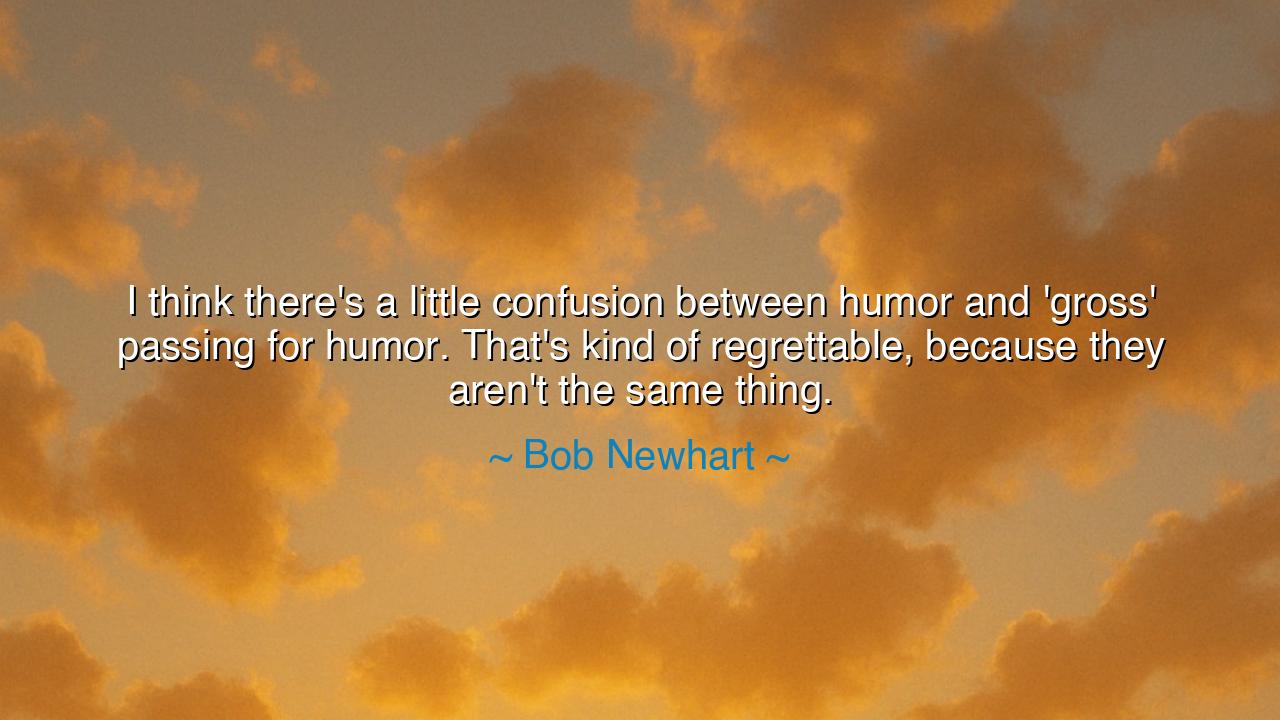
I think there's a little confusion between humor and 'gross'
I think there's a little confusion between humor and 'gross' passing for humor. That's kind of regrettable, because they aren't the same thing.






When Bob Newhart said, “I think there’s a little confusion between humor and ‘gross’ passing for humor. That’s kind of regrettable, because they aren’t the same thing,” he spoke not merely as a comedian, but as a philosopher of laughter — a guardian of wit in an age that often mistakes noise for art. His words carry a timeless lament: that true humor, which springs from wisdom and empathy, has been overshadowed by crudeness, which relies on shock and vulgarity. In his gentle but firm observation, Newhart reminds us that comedy, when stripped of heart and thought, ceases to be comedy at all. For humor, in its purest form, is not born of offense — it is born of understanding.
The meaning of this quote reaches deep into the soul of human expression. Humor has always been sacred to the spirit — a means of lightening the burdens of life, of seeing truth through the veil of laughter. But when humor becomes gross, it loses its higher calling. It becomes a mirror that distorts rather than reflects, a spark that burns rather than warms. True humor allows us to recognize our flaws with gentleness and grace; grossness only exploits them for shock. To confuse the two, as Newhart warns, is to trade the gold of insight for the cheap coin of reaction. Laughter without purpose may be easy, but it is hollow — like thunder without rain.
The origin of Newhart’s insight lies in his life and art. Known for his quiet, thoughtful, and dry comedic style, he relied not on vulgarity or spectacle, but on the profound power of understatement. His pauses were deliberate; his tone, humble; his humor, kind. Through the stillness of his delivery, he revealed a world both absurd and tender. In this, he echoed the ancients who taught that the best speech is that which stirs both the mind and the heart. He knew that laughter could teach as well as entertain — that it could illuminate truth without bruising dignity. His comedy was a lesson in restraint, proof that brilliance often resides not in volume, but in clarity and thought.
Consider the story of Charlie Chaplin, the great silent comedian. Chaplin lived in a world ravaged by poverty and injustice, yet he chose not to curse it with vulgarity, but to redeem it with humor. In his film The Great Dictator, he parodied tyranny itself — not through obscenity, but through moral courage and satire. He made the world laugh at fear, and in doing so, he disarmed it. That is the power of true humor: it exposes falsehood without cruelty and delivers truth without contempt. The laughter he inspired did not degrade; it uplifted. In this, Chaplin stood beside Newhart in spirit, proving that humor rooted in wisdom has the strength to heal even the darkest wounds of humanity.
Newhart’s lament, then, is not nostalgia — it is a warning. He saw a generation drifting toward the easy and the shocking, mistaking provocation for brilliance. Grossness is easy; it requires no intelligence, no empathy, no craft. It provokes the body but not the soul. Humor, on the other hand, demands understanding. It is the laughter of recognition — the moment when we see ourselves and forgive our foolishness. It draws people together rather than driving them apart. To choose grossness over humor is to surrender art for sensation, connection for reaction, humanity for noise.
In the ancient world, the playwright Aristophanes understood this distinction well. His comedies mocked the corruption of Athens, but beneath the laughter was always a moral pulse — a desire to make men better, not smaller. He wielded humor as a sword of truth, sharp but noble. And when his critics accused him of mockery, he replied that laughter was the most honest weapon against hypocrisy. This is what Newhart reminds us of — that true humor carries responsibility. It should challenge without demeaning, enlighten without obscenity, and uplift without cruelty.
So, my listener, take this lesson to heart: guard your laughter as you would guard your soul. Ask yourself — what kind of laughter do I create, and what kind do I share? Seek laughter that elevates the spirit, not laughter that soils it. There is nothing wrong with fun, but even joy has its dignity. When you speak in jest, let it reveal kindness; when you laugh, let it be from understanding, not mockery. Be discerning in what amuses you, for the things that make us laugh also shape what we become.
For in the end, Bob Newhart’s wisdom teaches us that humor is not a refuge for the careless, but a craft for the wise. To make another laugh without wounding them is one of the purest acts of love. Let your words carry that same grace. Be thoughtful in your wit, gentle in your irony, and compassionate in your laughter. Remember that true humor — the kind that endures — is never “gross.” It is human, honest, and eternal, a soft light in a darkened world. And those who wield it rightly do not simply make others laugh — they make them see.






AAdministratorAdministrator
Welcome, honored guests. Please leave a comment, we will respond soon